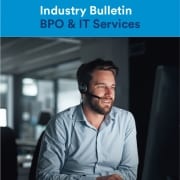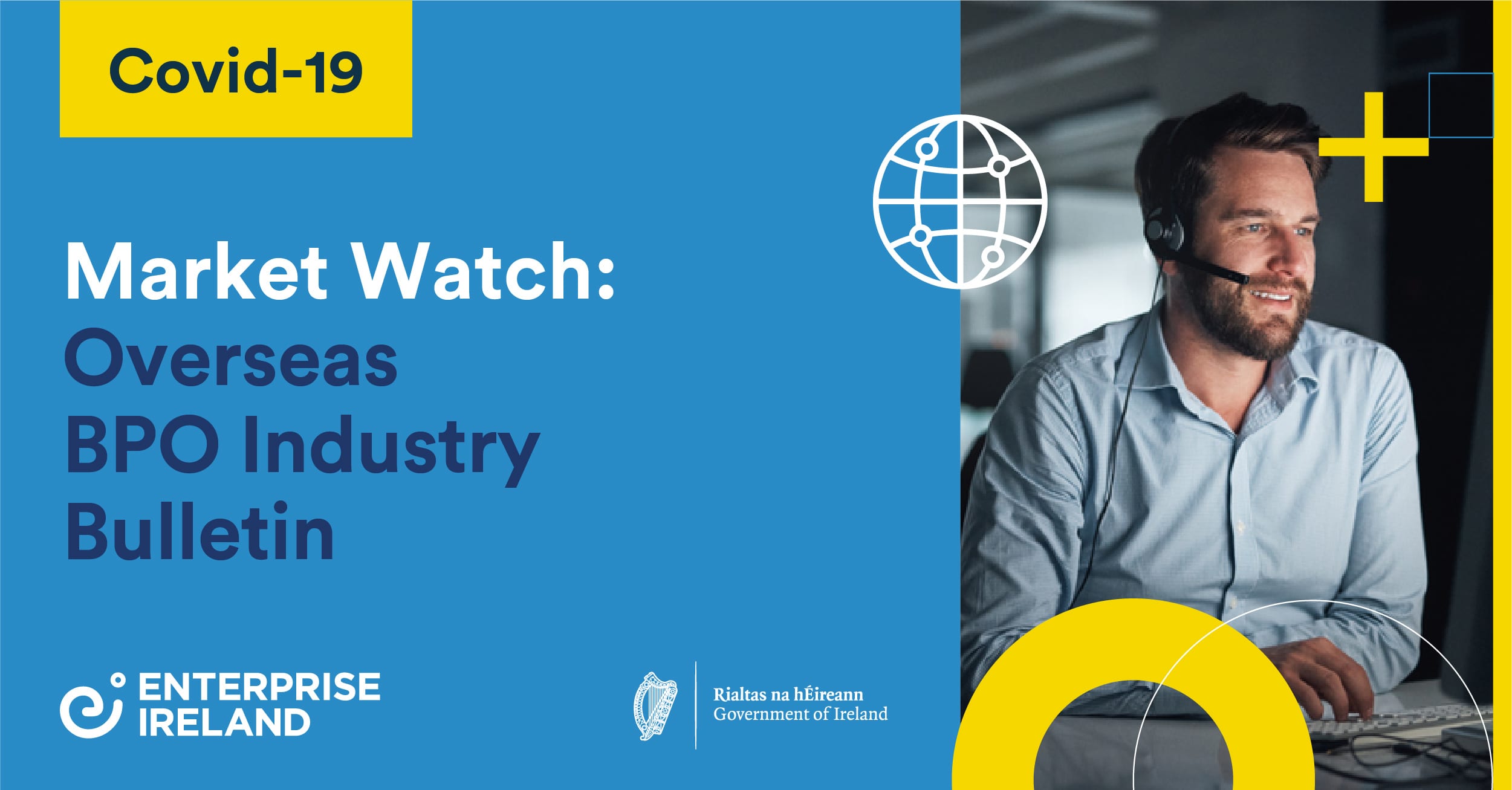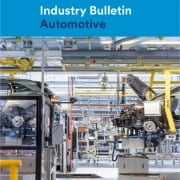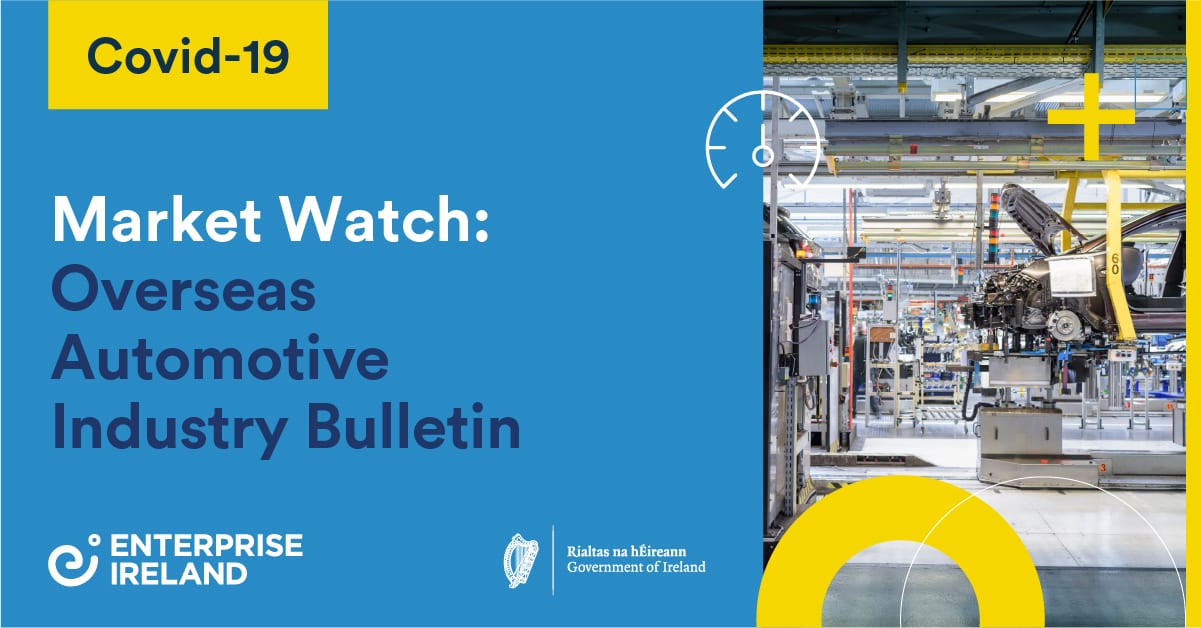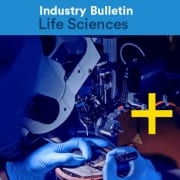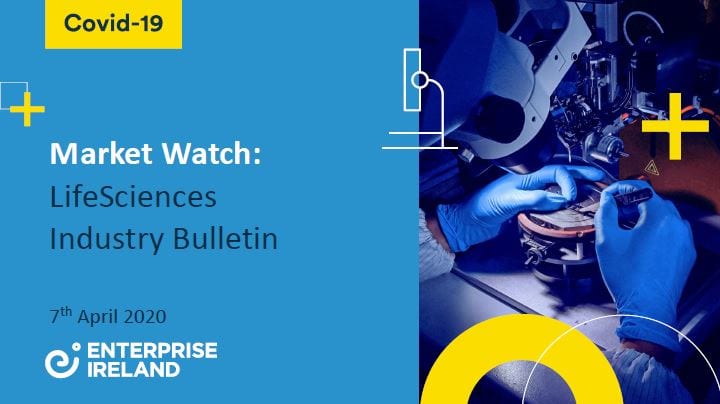Market Watch Industry Bulletin – Fintech & Financial Services
Download the bulletin here.
Enterprise Ireland financial services & fintech companies are facing unprecedented challenges to continue to build and scale their businesses globally at the rate they were before the crisis. Though they are demonstrating an impressive flexibility and innovation capability to adapt to the new situation and to fulfil their clients’ emerging challenges.
Enterprise Ireland‘s Market Watch for the financial services industry provides insights on the potential impact of Covid-19 on your business. Read the bulletin here.
Market Watch Industry Bulletin – BPO & IT
Download the bulletin here.
In a time of uncertainty and disruption across every industry, companies are reliant on their customer experience and IT teams to ensure they remain connected to their client base, particularly those in front line industries
Irish Outsourcing and IT companies are providing critical services to ensure international companies can overcome these engagement challenges from a remote setting. In our BPO & IT Services Industry Bulletin, Enterprise Ireland’s market advisors reflect on the impact of Covid-19, and outline significant international developments, opportunities, financial supports, and challenges facing Irish companies in the sector.
Read the full report here.
Market Watch Industry Bulletin – Automotive
Download the bulletin here.
The global automotive industry faces an as of yet unseen level of disruption to its production capabilities. Companies along the supply chain are challenged by a drop in demand for vehicles and related products, fragmentation of international supply chains and production plant closures of most OEMs and Tiers. Markets are transforming at an unprecedented pace, with experts rushing to forecast the outcomes and offer solutions to the rapidly changing industry where necessary.
Enterprise Ireland’s first Automotive Industry Bulletin contains a summary of major developments, opportunities and challenges as well as relevant funding supports for each region. The assessment is based on the insights from Enterprise Ireland Global Market Advisors for the automotive industry.
Read the full report here.
Innovation and creativity in a time of crisis
The Covid-19 crisis has brought out the best in Irish companies, which are facing the crisis with a range of innovative solutions.
Repurposing production lines to manufacture personal protective equipment (PPE)and hand sanitiser, new digital healthcare apps, and the rapid development of new test kit componentsare just a few of the many highly innovative responses to the Covid-19 crisis that have emerged from Irish companies in recent months.
“It’s amazing how resourceful and creative people become when they are challenged,” says Enterprise Ireland, Divisional Manager for Innovation & Competitiveness, Tom Kelly. “We are seeing companies innovating, adapting and creating new solutions and product lines in response to the crisis.”
Pivoting business to address a need
He points to the shortage of hand sanitiser products as an example. “The need for a massive increase in supplies was one of the earliest instances. Several companies repurposed their existing systems to manufacture them. Mervue in Cork partnered with Irish Distillers and is selling directly into the HSE. EPC in Clara, Co Offaly manufactures medicated toothpaste, but has set up a completely new line for sanitisers; it went to Grants in Tullamore to secure a supply of alcohol. EPC is also selling into the HSE and other markets. That story has been repeated by other companies like Univet, Chanelle and Ovelle.”
The shortage of PPE is also being addressed. “Irema Ireland ramped up production to increase supplies of high-quality surgical and respiratory masks,” says Kelly. “Other companies are looking at aprons and gowns, but that’s still at an early stage.”
“From a standing start, we have seen a number of companies like Key Plastics step up to manufacture face shields for use in the health service. The engineering sector has been particularly responsive” says Kelly.
Moving into the lab, Aalto Bio Reagents is manufacturing a nucleocapsid protein for diagnostic tests. This is known as a lysis buffer, which is used for the purpose of breaking open cells. “Aalto Bio Reagents worked very closely with the HSE and the National Virus Reference Laboratory and came up with a formulation within a week. Serosep is another company that is manufacturing test kits. You have to recognise the courage and capability of companies like that. What they are doing is the result of an innovative mindset, which is serving the country very well at present.”
It is not only established companies that are making a contribution. Enterprise Ireland-supported high potential start-up (HPSUs) are also playing their part. “CALT Dynamics in Wicklow, a 3D printing start-up in Ireland, are printing 3D printable protective visors that could help to bridge the shortfall of PPE both in Ireland and overseas,” says Enterprise Ireland, HPSU Manager, Industrial & Lifesciences Alan Hobbs. “It has linked up with Automatic Plastics in Tinahely and is now supplying products to a number of hospitals.”
Digital Health
These early-stage companies are making a particular mark in the digital health realm. “We’ve been seeing a distinct uptick in that area,” says Hobbs. “A number of Irish companies have secured contracts with the HSE, and with other health services. We now have a cohort of innovative young Irish start-ups that have just secured their first reference sites in the domestic market. This is very important, because when they go abroad, they will get asked about sales at home.”
One such company is practice management software developer Wellola. It has launched a secure patient communication portal for the HSE that enables GPs to treat people remotely if possible.
Meanwhile, all appointments at Covid-19 urgent test centres are scheduled using software from another innovative Irish firm, Swiftqueue. “Patients don’t realise that this is being done on Irish-developed software,” says Hobbs.
These are just a few among many new healthcare solutions being brought to market by Irish firms, according to Hobbs. “PMD Solutions is trialling new respiratory monitoring technology with Beaumont Hospital at the moment. This fits in with the HSE strategy of shifting care into the community, and it takes a lot of the stress off hospitals. Jinga Life’s technology for the e-transfer of CT scans means less handling of CDs and so on, and it also reduces risk of infection. Finally, patientMpower provides the tools for patients with lung complaints to be followed remotely with integrated medication management. The company is also providing a new remote triage service for Covid-19 patients in the home.
“There is also an impact on supply chains. Having companies doing these things locally makes a huge difference to delivery times.” says Hobbs.
Looking to the future, Kelly says the Covid-19 crisis is likely to change the way we think about healthcare supply chains. “We already recognise the need for food security and energy security. It is becoming increasingly obvious that healthcare security has to be viewed in the same way.”
To learn more about the steps companies can take to address the impact of Covid-19 visit our business supports page.
Market Watch Industry Bulletin – Cleantech
Download the bulletin here.
The global cleantech and energy industry is experiencing significant disruption and operational issues due to Covid-19. In addition, changing patterns of energy demand, declining oil prices, the continued growth of renewable energy generation and stringent climate action plans, means global markets are changing at pace.
In this bulletin, Enterprise Ireland’s market advisors assess the implications of Covid-19 on the sector and summarise the major developments, opportunities and challenges across international markets.
Read the full report here.
Market Watch Industry Bulletin – Transport
Download the bulletin here.
As an island economy, our economic prosperity is heavily dependent on the reliability of the global transport networks to consistently source key materials from suppliers and in turn ship the finished goods to customers.
The Transport Bulletin provides insights from Enterprise Ireland’s market advisors and industry experts across the world, bringing you a practical overview of freight transport conditions from different markets.
Market Watch Industry Bulletin – Agritech & Machinery
Download the bulletin here.
The Irish agricultural machinery and agritech sector has been designated as a critical service, committed to supplying customers and fulfilling current and future orders. While the sector is open, the Covid-19 crisis presents significant challenges.
Enterprise Ireland‘s Agritech and Machinery industry bulletin looks at international developments from labour shortages to supply chain issues to border closures, and industry stimulus packages which may impact your business.
Read the full report here.
Communications moves up to the Covid-19 front
Poppulo helps ensure first casualty of war on virus isn’t truth
Irish technology company Poppulo is supporting critical communications for frontline workers in the battle against Covid-19.
The company, which is a global leader in employee communications technology, has opened up its secure, effective communications platform to healthcare crisis teams battling the pandemic – for free.
It is already assisting public health services such as Ireland’s Health Services Executive (HSE), having fast-tracked the set-up process so that its Covid crisis team can get up and running on the platform as quickly as possible.
Effective employee communications are Poppulo’s stock in trade. It manages secure communications between over 25 million employees, in over 900 companies, across more than 100 countries, every day.
Its clients are some of the world’s most successful organisations. These include pharmaceutical company GSK (GlaxoSmithKline), car maker Rolls Royce, fast moving consumer goods company Unilever, telecoms giant Telefónica and building systems specialist Johnson Controls.
The Cork, Ireland based company has its US headquarters in Boston, MA. It specialises in enabling organisations with more than 1000 employees to solve the kind of complex employee communication and engagement challenges that can arise in large, international workforces.
Its custom-built software is designed for internal communications only, enabling managers to plan, target, publish and measure the impact of their communications across multiple digital channels.
These include email, mobile, video and social networks, all of which are handled securely via the Poppulo platform. It also provides organisations with extensive analytics, enabling them to measure and assess employee sentiment.
Staff under pressure
In recent weeks, communications relating to the COVID-19 crisis have soared on the platform.
“The key thing for organisations is to understand how important good communications is to all employees,” says Poppulo founder and CEO Andrew O’Shaughnessy
Frontline workers are shouldering the heaviest burden right now but all employees are facing challenges in a changed world, especially remote workers.
“Everyone is under a lot of pressure. This is something that was forced on all of us really quickly and all of a sudden many employees found themselves at home,” he says.
Equally suddenly, organisations must find ways to replace all the invaluable interactions that usually take place in the workplace.
“With remote workers, you can’t just pick up the phone and ring people because they are in virtual meetings, and their calendars are crowded,” says O’Shaughnessy.
Single source of truth
Yet good internal communications are more essential than ever. “Employees are under pressure not just from their job but from feelings of isolation, overwhelm, and mental health issues. At a time like this, your employee base needs huge support,” he says.
Clear, secure and engaging communication is one of the most effective ways you have to support staff them.
“Right now there is a lot of disinformation about, and things are changing very quickly, on a daily basis. It is therefore really important for every company to establish itself as a single source of truth for employees,” says O’Shaughnessy
In “just a couple of weeks” organisations, both private and public, have undergone the kind of transformation project that would previously have been given 18 months to plan and execute, he points out.
Such a radical transformation can only succeed on the basis of having an effective communications strategy, both in terms of content and delivery.
That means avoiding the kind of disinformation that may come via public social media platforms, such as WhatsApp. These “can’t be locked down, are crowded with noise, don’t allow you to target individual people, and offer no visibility of who is reading them,” he says.
Tracking talk
Poppulo allows organisations to rapidly send urgent communications to whoever needs to get them, track what’s been read or not opened in real-time, and take corrective action through resends, updates and instructions.
Poppulo’s Blackout functionality kills the circulation of non-essential information by ensuring employees only get relevant and useful information, during specific times, increasing clarity while minimising over-communication. Its targeting capability lets users engage the people, sections, and geographies who need the information, without needlessly involving those who don’t.
Its survey functionality allows users understand how their communications are resonating, both in business units and across the organisation, with reports that can inform further actions. The platform also provides content templates which allow users to save valuable time, for greater speed, efficiency and sign off.
Trusted source
Crucially, it alleviates employee uncertainty in a time of crisis through personalised communications from trusted sources.
Poppulo’s secure communications platform works across a range of channels including email, mobile and video and right now video is proving hugely important as a way of helping remote workers cope with isolation, he says.
In any change management scenario organisations appreciate that good communications are the key to success. In a pandemic, they can be no less than the difference between life and death. It’s why communications has moved not just centre stage but up to the front.
“People are calling communications a critical business system. That has never happened before,” he says.
Managing supply chain risk
Global supply chains have been stretched to breaking point as a result of the COVID-19 pandemic. Enforced closures of companies, coupled with newly imposed border controls and other issues, have had a severe impact on many Irish businesses.
There are steps that can be taken to mitigate those effects, according to Shirlee Kelly, a strategic sourcing consultant with IDDEA, a strategic procurement consulting company.
“In Ireland, many companies rely on just-in-time delivery for the supply of goods and services, and the success of this strategy is dependent on highly integrated and efficient supply chains,” Kelly points out. “The availability of labour may impact on supply chains, while government actions may lead to delays in physically moving materials from location to location as well as at ports and across borders.”
As a first step, she advises businesses to assess their supply chain risks and identify those critical suppliers that can have a detrimental impact on the business. “Businesses should conduct a health check on their critical supply chains,” she says.
Start by looking at internal data.
-
Who are the high-spend, high-impact suppliers?
-
What are the immediate risks that you need to plan for?
-
How will you address any lack of supply?
-
What are the steps you need to take to ensure that you continue to meet your contractual obligations with customers?
Contingency Planning
The next step is contingency planning. “These plans may include, finding alternatives to normal supply routes, investing time in discovering and conditioning new suppliers,” Kelly advises. “Companies may need to change their sourcing strategies to include a more local approach. If companies are dependent on one supplier, they need to put measures in place to make sure they have sufficient stock and ensure business continuance. It is important for businesses of all sizes to build resilience across their supply channels and keep their key customers informed of the work they are doing to meet demand.”
Good supplier management is essential in order to reduce the potential impacts of supply chain disruption. “You may have 500 suppliers, so it is not possible to manage every supplier in the same way,” Kelly notes. “We use the Kraljic Matrix to categorise suppliers by the value you spend with them and the risk they pose to your ongoing operations.”
This matrix reveals those suppliers who are strategically important by evaluating them against their value to the bottom line and the risks of a disruption affecting their performance. High-value, high-risk suppliers clearly need careful management, as indeed do those in the low-value, high-risk quadrant who are defined as bottlenecks.
Supplier management begins with information.
“Capture all appropriate data about your critical suppliers, and use this information to drive value for your organisation. Using tools such as Porters Five Forces and PESTEL analysis as part of your market research, will allow you to assess and evaluate the external factors which may affect your industry and business operations.” says Kelly.
The data analysed, and the knowledge gained, forms the basis of your supplier performance management. “Ensure you have a scorecard in place to allow you measure supplier performance? What metrics do you use and are they aligned with what you are trying to achieve in your overall business strategy?”
“It is important that strategic suppliers work with you on risk management strategies,” she adds.
Those risk management plans should be based on four key elements – awareness, impact, mitigation, and contingency planning.
“Awareness is about understanding the probability and potential impact of the risk,” Kelly explains. “The goal of risk management is to recognise, reduce or mitigate the likelihood of risk. The objective is to identify procedures for managing all stages of risk, this includes, disruption – interruption, response, recovery and restoration of service.
She concludes by pointing out that doing nothing is not an option. “Companies need to act now, investigate the opportunities in your data, identify your key supply partners and work together on problem resolution. Treat key suppliers as an extension of the business and find out how you can support each other. Irish businesses are very good at working together in difficult times. Government bodies such as Enterprise Ireland are a great resource for information on the various supports available to Irish businesses. The companies I am currently working with are sharing information with their supply base and this is helping to ease supply chain problems.”
Market Watch Industry Bulletin – Life Sciences
Download the bulletin here.
Enterprise Ireland life sciences companies are experiencing extraordinary market conditions, resulting in unpredictable demand, production shortages and bottlenecks, as well as fractured supply chains.
While these are certainly unprecedented and challenging times, there remain significant opportunities for clients within the global lifesciences market. Read the full report in our industry bulletin.
Market Watch Industry Bulletin – Construction
Download the bulletin here.
Enterprise Ireland construction companies are experiencing unprecedented market disruption both domestically and across international markets.
In this first bulletin, we look at the movement of labour and materials, restrictions on access to sites, market supports and the projected implications of shutdown where this has occurred.





